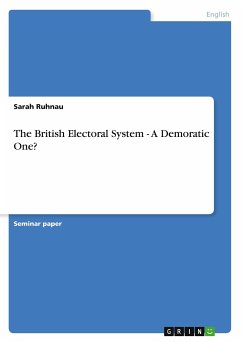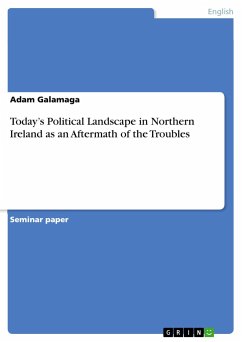
The British Electoral System - A Demoratic One?

PAYBACK Punkte
0 °P sammeln!
Seminar paper from the year 2010 in the subject English Language and Literature Studies - Culture and Applied Geography, grade: 1,7, Ruhr-University of Bochum (Englisches Seminar), course: Political Cultures in Britain, language: English, abstract: 1. Introduction"The British electoral system is not a gamble." (Butler, 194). This famous quotation by the British political scientist David E. Butler gives a first insight in how intricate and controversial the topic has been discussed. The quotation also shows that the British voting system never lacked criticism and the fact that Butler has to de...
Seminar paper from the year 2010 in the subject English Language and Literature Studies - Culture and Applied Geography, grade: 1,7, Ruhr-University of Bochum (Englisches Seminar), course: Political Cultures in Britain, language: English, abstract: 1. Introduction"The British electoral system is not a gamble." (Butler, 194). This famous quotation by the British political scientist David E. Butler gives a first insight in how intricate and controversial the topic has been discussed. The quotation also shows that the British voting system never lacked criticism and the fact that Butler has to deny that the electoral system of his home country is 'a gamble' makes clear that also a lot of sarcasm was involved while judging it. All of this seems rather negative. However, in this paper it is not my aim to just condemn the electoral system of Britain, nor do I want to prove that it is a gamble. Yet, the severe criticism must have a reason and cannot be completely unfounded. A main argument of critics that is often discussed is a possible lack of democracy. Therefore I would like to examine in how far the British voting system can be reconciled with basic democratic principles. To do so, it will be necessary to give a short overview about democracy and its main features. I also don't want to neglect to talk about democracy as a political system. In accordance with the main topic, namely the electoral system, I will specifically talk about the competitive and consensus democracy because they are most suitable when it comes to discussing the two main voting systems, viz. proportional representation and majority voting. As it has probably become clear already, I do not want to limit this paper to the British electoral system itself. To illustrate the discrepancy between the first-past-the-post system and the proportional representation, I will use the example of the Federal Republic of Germany. This country can be seen as a representative for a typical consensus democracy and in addition it is using the proportional representation quite successfully. By providing information about the common alternative system of voting, instead of just describing the system which is actually examined, it will hopefully become easier to judge the latter in the end. Arguable is now, to what extent the British electoral system deserves to be criticised or even disapproved. Is it "unpredictable" and "bizarre" as Marco Evers claims? (cf. Evers, 84). Or does the long-lasting tradition of using the majority voting system prove once more that its advantages outweigh its weaknesses and that there should not be any worries concerning its democratic compatibility?













